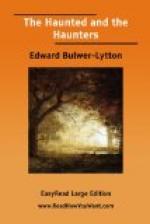“Can it be possible,” he inquired of himself, “that the appearances of last night can have any connection with the dreadful events of to-day? It must be so,” he said; “for three of the lights of my eyes, three of the guiding stars of my life, have been this day extinguished.” Thus reasoned M’Pherson; and, in the mysterious lights which he had seen, he saw that the doom of his children had been announced. But there were seven, he recollected, and his heart sunk within him as he thought of the three gallant boys who were still spared to him. One of them, the youngest, was at home with himself, the other two were in the Army—soldiers in the 42nd Regiment, which then boasted of many privates of birth and education. M’Pherson, however, still kept the appalling secret of the mysterious lights to himself, and determined to await, with resignation, the fulfilment of the destiny which had been read to him, and which he now felt convinced to be inevitable.
The gallant regiment to which M’Pherson’s sons belonged was, at this period, abroad on active service. It was in America, and formed a part of the army which was employed in resisting the encroachments of the French on the British territories in that quarter.
The 42nd had, during the campaigns in the western world of that period—viz. 1754 and 1758,—distinguished themselves in many a sanguinary contest, for their singular bravery and general good conduct; and the fame of their exploits rung through their native glens, and was spread far and wide over their hills and mountains; for dear was the honour of their gallant regiment to the warlike Highlanders. Many accounts had arrived, from time to time, in the country, of their achievements, and joyfully were they received. But, on the very day after the loss of The Catherine, a low murmur began to arise, in that part of the country which is the scene of our story, of some dreadful disaster having befallen the national regiment. No one could say of what nature this calamity was; but a buzz went round, whose ominous whispering of fearful slaughter made the friends of the absent soldiers turn pale. Mothers and sisters wept, and fathers and brothers looked grave and shook their heads. The rumour bore that, though there had been no loss of honour, there had been a dreadful loss of life. Nay, it was said that the regiment had made a mighty acquisition to its fame, but that it had been dearly bought.
At length, however, the truth arrived, in a distinct and intelligible shape. The well-known and sanguinary affair of Ticonderago had been fought; and, in that murderous contest, the 42nd Regiment, which had behaved with a gallantry unmatched before in the annals of war, had suffered dreadfully—no less than forty-three officers, commissioned and non-commissioned, and six hundred and three privates having been killed and wounded in that corps alone.
To many a heart and home in the Highlands did this disastrous, though glorious intelligence, bring desolation and mourning; and amongst those on whom it brought these dismal effects, was M’Pherson of Morvane.




